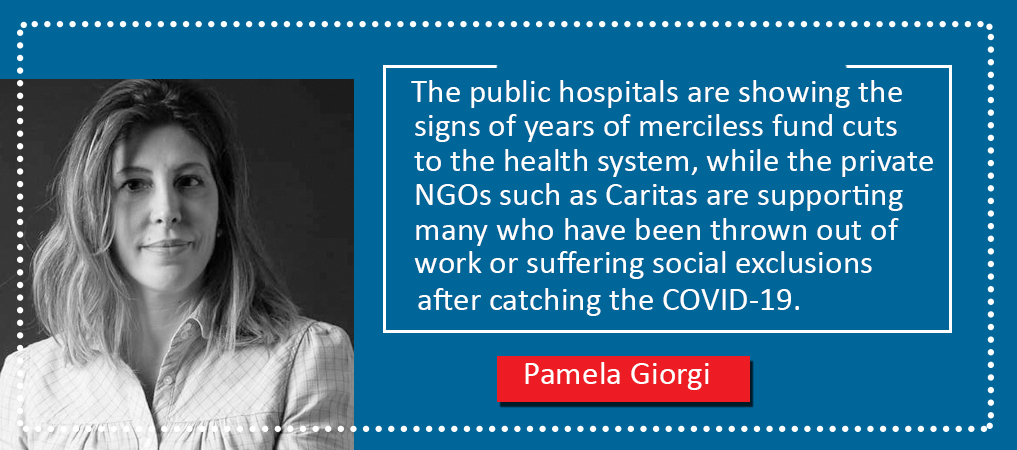COVID-19 Triggers Italy’s Systemic Crisis

Pamela Giorgi
With Italy entering second lockdown from early November, the people look much worried and exhausted. The country had already experienced Europe’s longest and strict lockdown in spring from March to June this year. Though no full lockdown has yet been imposed, tough restrictive measures are in place to contain the spread of COVID-19. Regions and autonomous provinces have been classified into three categories - red, orange and yellow -, corresponding to many risk scenarios, for which specific steps have been adopted as per the ordinances of the Ministry of Health. As of Monday, Italy recorded 1.59 million infections and 54,905 deaths from the virus.
The government has ramped up monitoring activities to break the virus chain based on the aggregated data sent by the regions and coordinated by the Ministry. The Civil Protection and Higher Institute of Health is supporting to collect relevant information on the total number of infections, deaths, hospitalisations and intensive care admissions in each province. The people have started to feel the heat of the second lockdown. The whole country, its cities and villages are changing their face. Be it Italians or migrants, who come here in the search for better livelihood opportunities - all have worried eyes above their masks that they have been wearing since March.
Tourism hit hard
The tourism sector is the worst-hit. There is no charm to be a tour guide, a restaurateur or a hotel employee for these job holders are likely the first to be laid off in the time of coronavirus crisis. The main Italian tourist resorts, in fact, are in great deflation. Famous cities like Florence, Rome and Venice known for their unique architectural and artistic beauties have become strange for the visitors. The cities, previously thronged by millions of tourists every day, now wear a semi-deserted look.
For sure there is a tragedy for those who work in the tourism sector, but we must say that for the first time in years of mass tourism there is a feeling that the residents of the historic centres are slowly taking back their cities, usually stormed by tourists. For cities of art, which mainly depend on tourism, the lockdown is a tragic drama from an economic point of view. There's a hope that a crisis like this will lead to solutions for the future. This calls for a reorganisation of the tourism economy for its sustainability. It must no longer be oriented only to bite-and-run visits but to slower and more structured journeys for a new model of cultural fruition. But right now these are just hopes for a better future.
For many workers, this second lockdown looks more painful as business activities have been suspended for months. In contract market, some companies have sent workers home but state support for them is insufficient. This is because the country’s welfare system has become fragile with the adoption of neo-liberal policies for the last 30 years. Statistics provided by Caritas, a non-profit organisation, states that the private sector has provided support to those, who are in need of food or accommodation, for a few months after they have lost job or have no money to fend for themselves.
On the other hand, the government is facing difficulty in catering medical service to the people in the time of pandemic. The public hospitals are showing the signs of years of merciless fund cuts to the health system, while the private NGOs such as Caritas are supporting many who have been thrown out of work or suffering social exclusions after catching the COVID-19. Since the beginning of the COVID-19 emergency, the services offered by Caritas - a help to shop, a hot meal, psychological support - have increased by 114 per cent. Families, who until the beginning of March never thought they would end up in poverty and not even have the money to do the shopping, are calling for support to them.
Economic emergency
The question is: how many of these people, after the emergency, can return to their work and a normal life and how many will be deprived of job? Nunzia De Capite, a member of the Forum of Inequalities and Diversity and sociologist of Caritas Italiana, shares that while the health emergency slows down, the economic emergency is ready to deflate. "A systemic crisis like this has brought to the fore the phenomena of economic and social inequality from which our country was already afflicted and is creating fractures that, if not dealt with quickly, risk becoming chasm that can no longer be healed. To these are added new situations that Caritas is taking charge of,” he states.
(Giorgi is an Italian journalist and works at the National Centre Of Education Research (INDIRE), Florence)
Recent News

Do not make expressions casting dout on election: EC
14 Apr, 2022
CM Bhatta says may New Year 2079 BS inspire positive thinking
14 Apr, 2022
Three new cases, 44 recoveries in 24 hours
14 Apr, 2022
689 climbers of 84 teams so far acquire permits for climbing various peaks this spring season
14 Apr, 2022
How the rising cost of living crisis is impacting Nepal
14 Apr, 2022
US military confirms an interstellar meteor collided with Earth
14 Apr, 2022
Valneva Covid vaccine approved for use in UK
14 Apr, 2022
Chair Prachanda highlights need of unity among Maoist, Communist forces
14 Apr, 2022
Ranbir Kapoor and Alia Bhatt: Bollywood toasts star couple on wedding
14 Apr, 2022
President Bhandari confers decorations (Photo Feature)
14 Apr, 2022











